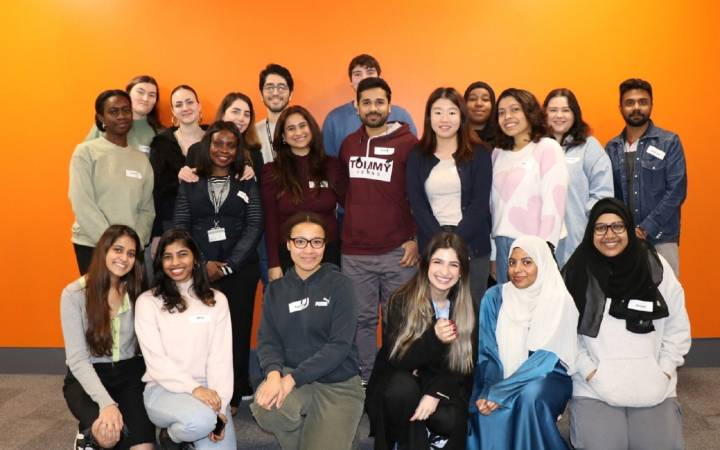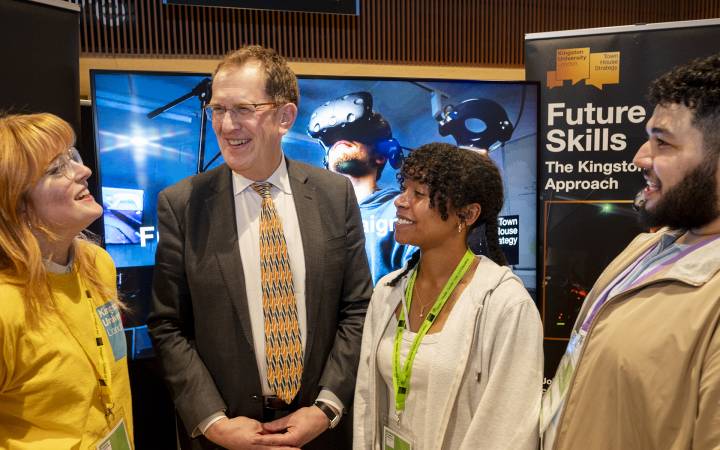Women in science – Helen Kemp
Posted Tuesday 6 May 2014
 Each week we bring you a profile of a Kingston alumna who has contributed greatly to the field of science.
Each week we bring you a profile of a Kingston alumna who has contributed greatly to the field of science.
This week we find out about Helen Kemp, who graduated in 1993 with a Biomedical Sciences BSc(Hons). She is currently a senior research fellow at Stable Isotope Forensics.
How did you first become interested in science?
I think the lure of the open flame of a Bunsen burner had something to do with it! I've always liked the heady smell of a wet chemistry lab – the proper old-fashioned labs with wooden work benches. The subject was very hands-on, interactive and in a way, similar to my hobby, cooking – which to the horror of my science teacher was also my back-up career plan. Compared to the very dry subjects of English literature or geography, I'd gain immense satisfaction from determining the calorific content of a peanut or watching various elements producing differently coloured flames when held over a Bunsen burner.
What did you do after leaving Kingston?
PhD – Dundee University: Molecular Biochemistry Post Doctoral Research Assistant – Dundee University: Stable Isotope Applications Research Fellow – Queen's University Belfast: Environmental Forensics & Human Health Senior Research Fellow – SCRI: Stable Isotope Forensics Senior Research Fellow – The James Hutton Institute: Stable Isotope Forensics.
What's it like being a woman in the scientific workplace?
Fun! Most of the time.
Can you tell us any quirky or unusual experiences from your career?
A not-so-well known fact, told to me by my first boss and something I've been itching to try ever since – maybe the day before I retire and leave the lab for good – you can cook the perfect pizza in a GC-oven (gas chromatography oven)! The temperature control is second to none, you can pre-programme a temperature ramp to suite your toppings and type of base, and you don't get any of the uneven cooking caused by hot-spots or cool-zones so often present in conventional fan-assisted or gas ovens.
What's a typical day like?
Every day is different as the lab handles such a diverse range of samples. A typical week could see me analysing heroin and cocaine, soft fruit extracts, dead jellyfish and whisky. Then the next week could be pumpkin seed oil samples, human tissue samples and a selection of Viagra tablets. Certainly never a dull moment.
How can society encourage more women into science?
I'm not really comfortable with any form of positive discrimination. You need the right person in the right job regardless of gender, age etc. Any person who wishes to pursue science as a career should be encouraged at all levels and assisted through scholarships, active mentoring and so on where applicable (and more importantly, where available!). I don't believe gender is necessarily an impediment to entering a scientific career. Certainly when looking at forensic science courses, the number of female students frequently exceeds the number of males. Maybe the question should be how do we retain women within science?
If you have children, would you encourage them to follow a career in science and technology and do you think scientific talent is based on nature or nurture?
I don't have any children but I would encourage any young person to go into science if they can demonstrate the appropriate basic skills and if they're prepared for long hours, hard work and a fair share of disappointment.
Experimental preps rarely work first time, so determination, commitment and a healthy dose of pig-headedness are invariably required to succeed.
Scientific talent – like most talent, I think – is a combination of nature and nurture. You need to have the right temperament to succeed, but without a sound knowledge base, being keen and interested will only get you so far.
The field of science though is tremendously wide and varied and offers a huge range of opportunities for a broad spectrum of abilities.
Have any doors opened as a result of your science education outside the field?
It's tricky to judge. I'm not sure any doors have actually opened outside the field of science as a direct result, but having a degree in an analytical subject certainly equips you with some vital skills that are equally applicable and transferable outside. How to think, how to process information, apply knowledge and probably the most commonly utilised, how to learn from ones mistakes!
Are there certain skills which women can offer in the science and technology world compared to men?
That's a bear-trap of a question and is based on the 'sticky-wicket assumption' that there are skills that are unique to the female or male character. Maybe I could answer it by saying that the skills I hope I bring to the science and technology world are those I appreciate most in my fellow researchers, female and male: professionalism, honesty, pragmatism and last but by no means least, a good sense of humour.
How well paid is a science career?
You don't follow an academic career in science for the salary that's for sure, although I don't think science is singled out here. I imagine the same can be said for the majority of academic disciplines. However, I consider myself incredibly lucky to be working in the field of science. I do a job that I love, in a relatively relaxed but at the same time highly productive environment. So, thats the 'payoff' if you like and to quote Mick Jagger – not something I do terribly often – 'you can't always get what you want'!



